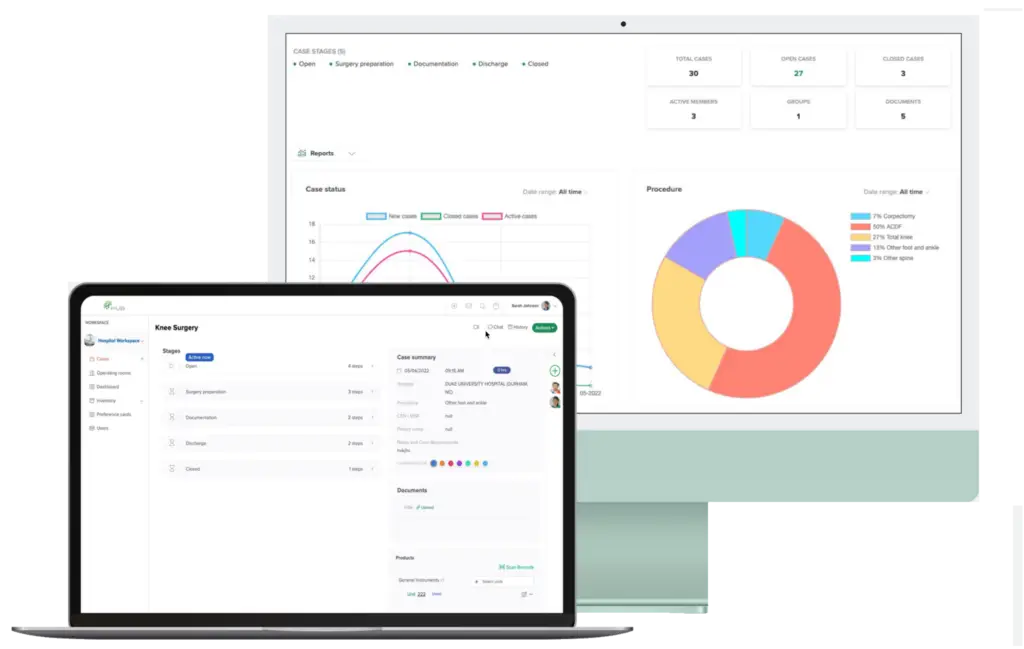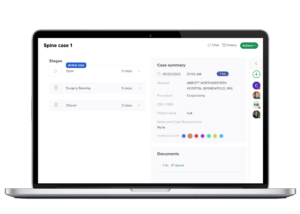In today’s fast-paced healthcare environment, effective care coordination is critical to delivering high-quality patient care. With patients often receiving services from multiple providers across various settings, communication and coordination are essential to avoid errors, improve outcomes, and enhance patient satisfaction. In this blog post, we’ll explore what care coordination is, the role of care coordinators, and why HUB Healthcare is the best software for optimizing care coordination. Additionally, we’ll discuss the specific benefits that care coordination can bring to patient activity and overall healthcare operations.

What Is Care Coordination?
Care coordination refers to the deliberate organization of patient care activities between multiple healthcare providers. It involves the timely sharing of information, monitoring of treatment plans, and collaborative decision-making to ensure that patients receive the necessary care when and where they need it. Care coordination is particularly crucial in complex cases, where patients are seeing multiple specialists, receiving different treatments, or transitioning between care settings (e.g., from a hospital to a rehabilitation center).
By focusing on the patient’s needs and preferences, effective care coordination helps reduce medical errors, prevent unnecessary hospital readmissions, and improve patient outcomes.
What Is a Care Coordinator?
A care coordinator is a healthcare professional responsible for facilitating communication between different healthcare providers and ensuring that patient care is effectively coordinated across all services. Care coordinators often work in hospitals, outpatient clinics, and emergency departments. They manage patient care plans, arrange follow-up appointments, and help patients navigate the healthcare system.
Emergency Department Care Coordinators: A Vital Role
In an emergency department (ED), care coordinators are essential to managing high patient volumes and ensuring that individuals receive timely and appropriate care. They work closely with ED staff, specialists, and primary care providers to plan patient discharge, transfer to other facilities, and follow-up care. This role involves swift decision-making and excellent communication skills to reduce wait times, minimize unnecessary admissions, and ensure a smooth transition of care.
What Is Care Coordination in Nursing?
Care coordination in nursing is an integral part of a nurse’s role, especially for patients with chronic conditions or complex healthcare needs. Nurses often take on the role of care coordinator, ensuring continuity of care across different healthcare settings, such as hospitals, long-term care facilities, and home care services. Nursing care coordination focuses on developing patient-centered care plans, educating patients about their treatment options, and acting as liaisons between doctors, patients, and family members.
Best Software for Care Coordination
Given the complexity of today’s healthcare landscape, healthcare organizations need advanced tools to manage care coordination effectively. This is where HUB Healthcare comes in. HUB Healthcare’s software is designed to streamline all aspects of care coordination, improving collaboration between providers and enhancing patient outcomes.
Key Features of HUB Healthcare’s Care Coordination Software:
Comprehensive Care Pathways
HUB Healthcare allows care coordinators to create and manage clinical pathways, ensuring that each patient receives consistent, evidence-based care. These pathways guide care providers through standardized treatment protocols, reducing the chances of medical errors and improving patient outcomes.Automated Communication Tools
Communication is the cornerstone of effective care coordination. HUB Healthcare’s automated messaging system sends reminders, follow-up notices, and real-time alerts to care providers and patients, ensuring that everyone stays informed and on track.Integrated Medical Case Management
With HUB Healthcare’s medical case management feature, care coordinators can track all aspects of a patient’s treatment, from initial diagnosis to recovery. This includes managing care transitions, scheduling appointments, and documenting patient progress. The platform also integrates seamlessly with electronic health records (EHRs) for better data accuracy and accessibility.Analytics for Improved Decision-Making
HUB Healthcare provides real-time analytics that allow healthcare providers to monitor performance, patient outcomes, and operational efficiency. These insights can help identify bottlenecks in care coordination, improve resource allocation, and optimize workflows.Secure Document Management
HUB Healthcare’s secure, HIPAA-compliant document management system ensures that patient information is protected while allowing authorized users easy access to critical documents such as discharge summaries, care plans, and medical records.
Benefits of Using HUB Healthcare for Care Coordination:
- Enhanced Communication: Reduces gaps in communication between healthcare providers, ensuring that everyone is on the same page regarding patient care.
- Improved Patient Activity: By providing coordinated care, patients are more engaged in their treatment plans, leading to higher activity levels, improved recovery rates, and better overall health.
- Reduced Errors: Ensures that providers follow established clinical pathways, minimizing the risk of miscommunication and medical errors.
- Better Patient Satisfaction: Streamlined care coordination results in shorter wait times, fewer delays, and improved patient satisfaction scores.
- Cost Savings: Efficient coordination leads to fewer duplicate tests, reduced hospital readmissions, and lower overall healthcare costs.
How to Improve Patient Activity Through Care Coordination
One of the key benefits of effective care coordination is the improvement of patient activity and engagement. When patients receive well-coordinated care, they are more likely to follow treatment plans, attend follow-up appointments, and adhere to prescribed medications. HUB Healthcare’s platform facilitates this by providing:
- Patient Scheduling Efficiency: Coordinators can easily schedule follow-up visits and treatments, ensuring that patients remain engaged and active in their healthcare.
- Automated Reminders: The system sends automatic reminders for upcoming appointments, medication schedules, and physical therapy sessions, keeping patients on track with their care.
- Patient Portals: HUB Healthcare offers a user-friendly patient portal where individuals can access their care plans, appointment schedules, and health information, empowering them to take a more active role in their treatment.
The Role of Care Coordinators in Improving Patient Activity
Care coordinators are key to improving patient engagement and activity. By providing personalized support and addressing any barriers to care, they ensure that patients are fully involved in their treatment. HUB Healthcare supports care coordinators with tools to monitor patient progress and intervene when necessary to keep them on track.
Conclusion: Why HUB Healthcare Is the Best Solution for Care Coordination
Care coordination is a complex yet essential component of patient care, requiring effective communication, collaboration, and data management. HUB Healthcare’s platform is designed to simplify these tasks, providing healthcare organizations with the tools they need to enhance care coordination and improve patient outcomes. From automated communication to real-time analytics, HUB Healthcare offers the best software solution for care coordination.

How HUB Healthcare Can Help
HUB Healthcare offers a comprehensive solution designed to enhance communication in healthcare, streamline care coordination, and improve overall workflow efficiency. Our platform includes features such as medical case management software, healthcare document management, and healthcare analytics to ensure that all aspects of patient care are optimized. By leveraging HUB Healthcare’s robust tools, organizations can reduce workflow bottlenecks, automate repetitive tasks, and facilitate better collaboration among healthcare providers. This not only improves work quality but also enhances patient outcomes, making HUB Healthcare an essential partner in achieving healthcare excellence.





